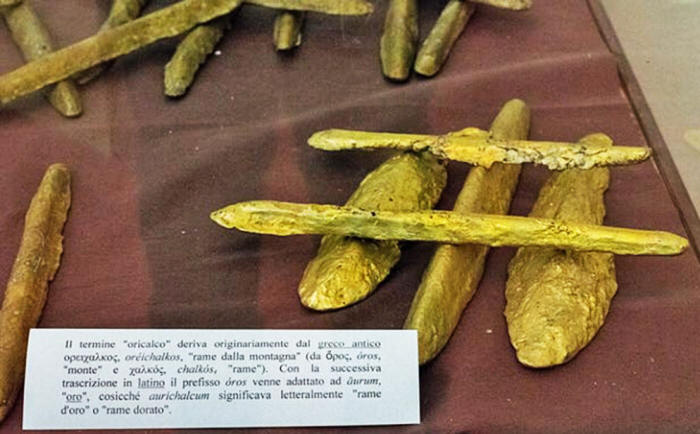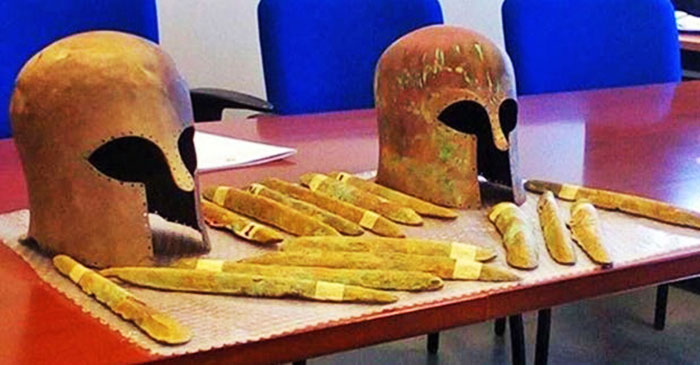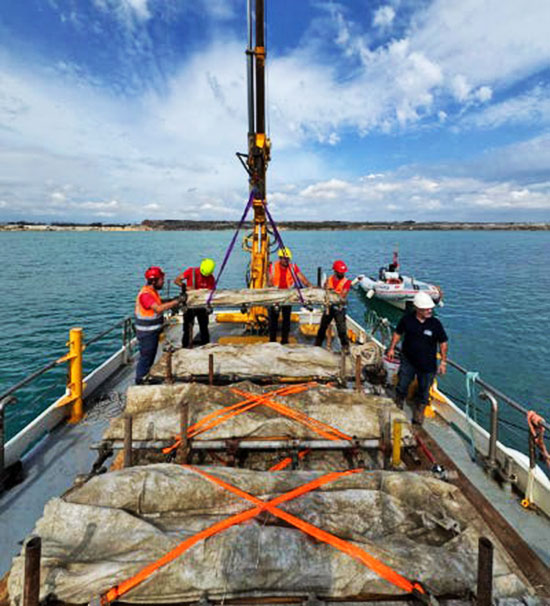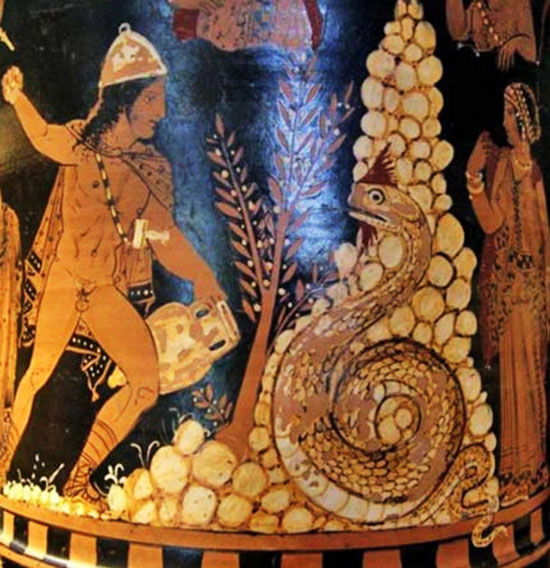|

by Gary Manners
October 05, 2024
from
AncientOriginsUnleashed Website

Bars of Orichalcum,
Gela museum, Sicily.
Source: Emanuele
riela/
CC BY-SA 4.0
At the beginning of 2015, several world news organizations reported
that archaeologists had recovered 39 ingots of orichalcum
from a 2,600-year-old shipwreck, found ten feet underwater off the
coast of Sicily, near the town of Gela.
For those not familiar with the name, according
to Plato,
orichalcum was a type of copper
alloy broadly used by the legendary Atlantians.
Not surprisingly, while the ancient cargo provided the basis to
every news report, unfortunately, none of the stories exposed
anything new on
Atlantis, or on the "mystical" ore,
as one reporter called it.
Essentially, every editorial capitalized on
repeating the same familiar story, raising the usual questions, and
sadly arriving at the same past conclusions. Nothing new...!
As for the particular freight, most reporters
connected it to Atlantis, as if Atlantis was around during the
Bronze Age (thus, misleading everyone not so familiar with the
story) and ignoring the fact that,
according to Plato, the story of Atlantis
took place around 9,600 BC...
In 2017, a further 47 ingots were retrieved,
along with a couple of Corinthian helmets, and just this week, the
recovery of all the timbers of the ship has been reported as well
underway.

Some of the orichalcum ingots
and the two
Corinthian helmets
found near a
2,600-year-old shipwreck
off the coast
of Sicily.
Source:
Superintendency of the Sea, Sicily
Just How Special is this Cargo?
While titles like "Atlantis' gold", and statements such as,
"...the ancient shipment proves that Atlantis
did exist",
...without a doubt capture peoples imagination,
the truth is, there is nothing mystical, or unusual about
orichalcum, as various newspapers, magazines, and the media seem
to imply at every opportunity.
In fact, the particular shipment of orichalcum found off the
coast of Sicily most likely originated from the Greek island of
Cyprus, in the eastern Mediterranean.
Historically, since the 4th millennium
BC, Cyprus is known to have produced every copper variation known to
man, including orichalcum,
essentially a mixture of copper and zinc,
with small traces of nickel and iron.

Recovery of the Gela
II shipwreck
(Soprintendenza
del Mare)
During the Bronze Age, and especially prior to the 7th
century BC, records show that the word orichalcum, which
originates from the Greek name oreichalkos (literally meaning
"mountain copper") may have been what the early Greeks called
copper (all variations of it).
Prior to the 5th century BC, as the Greeks ruled the
eastern Mediterranean, orichalcum, a term which by the way
may have also originated in Cyprus, was essentially a common product
used not only by the Greeks, but by those who traded with them as
well.
Historically, the word orichalcum began to fade and nearly
disappeared from the Mediterranean vocabulary after the Romans
became the new masters of the region.
Several Greek names, including that of
oreichalkos were, in time, replaced with their Latin
counterparts.
Eventually, even the ancient Greeks modified the
original name and oreichalkos was ultimately shortened to
chalkos, a name that is still in use today.

Cadmus,
the Greek
mythological figure
who is said to have
created orichalcum
(Louvre
Museum/Public Domain)
During the Roman period, Cyprus (Kypros in Greek) continued to be
the number one source of copper for the entire region.
So much copper was actually extracted out of
Cyprus during the Roman era, the Romans originally named the ore
after the island itself, "aes Cyprium" (meaning metal of Cyprus), a
phrase that ultimately replaced the Greek word orichalcum.
Over time the short phrase was simplified to
"cuprum" (copper in Latin), and in modern days that changed to
"copper", the English version of the Latin name.
What is most interesting about this name, though, is that while many
experts and scholars are still debating on the origins and/or
composition of orichalcum, it is worth mentioning that even
to this day, more than three thousand years later, the Greek
population of Cyprus still calls the local produced copper
oreichalkos (orichalcum, if you prefer).
For more on Atlantis, read "Atlantis
- The Find of A Lifetime" by Christos Djonis.
|





